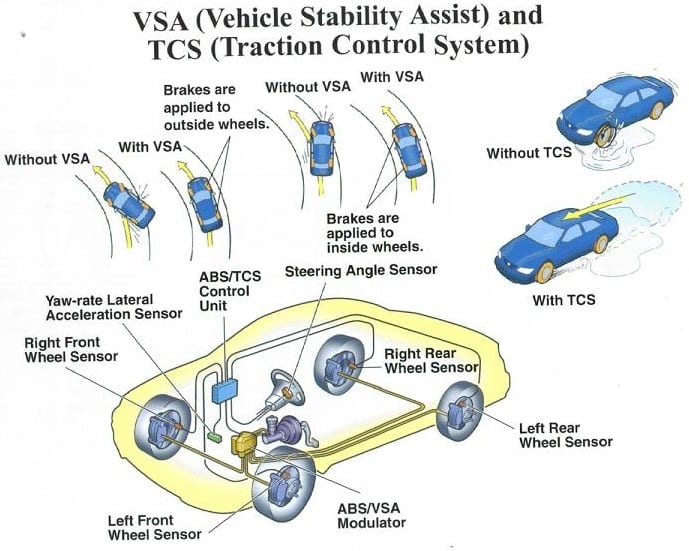Driving on slippery roads or terrains can be treacherous, which is why many modern vehicles are equipped with traction control systems to enhance stability and prevent accidents. However, even the most advanced systems are not foolproof and can malfunction over time, leading to costly repairs. In this article, we will delve into the intricacies of traction control systems and explore the factors that influence the cost of repair.

Image: axleaddict.com
Traction control systems operate by monitoring the speed of each wheel. When a wheel starts to slip, the system intervenes by reducing engine power and selectively applying brakes to restore traction. This prevents the vehicle from skidding or losing control, especially during acceleration, cornering, or driving on slippery surfaces.
Understanding Traction Control Components and Potential Issues
The complexity of traction control systems varies depending on the vehicle make and model. Generally, the system consists of several key components:
- Wheel speed sensors: Monitor the speed of each wheel and relay the information to the system’s control unit.
- Control unit: Analyzes the wheel speed data and determines when to activate traction control.
- Actuators: Typically electronic components that control the engine’s fuel delivery or brake application.
Issues with any of these components can lead to traction control system malfunction. Common problems include:
- Faulty wheel speed sensors: May provide inaccurate or erratic readings, causing the system to misinterpret wheel slip.
- Control unit failure: Rare but can result from electrical issues or internal malfunctions, affecting the system’s decision-making abilities.
- Actuator problems: Can prevent the system from physically adjusting engine power or applying brakes when needed.
Cost of Fixing the Traction Control
The cost of repairing a traction control system depends on several factors:
- Vehicle make and model: Different vehicles have unique traction control systems, which can vary in complexity and cost to repair.
- Type of malfunction: The nature of the issue, whether it’s a faulty sensor or a major component like the control unit, will impact the repair cost.
- Diagnostic fees: Mechanics may charge a fee to diagnose the problem before commencing repairs.
- Labor costs: The time and effort required to diagnose and fix the issue can vary and affect the overall labor charges.
- Parts availability: If specialized parts are needed, their availability and cost can influence the repair expense.
Based on these factors, the cost of repairing a traction control system can range from a few hundred dollars for simple sensor replacements to several thousand dollars for more complex repairs involving the control unit or actuators. It’s important to note that these are estimates, and the actual cost may vary depending on your specific situation.
Preventing Traction Control Issues
While it’s not always possible to prevent traction control malfunctions, regular maintenance and proper driving habits can reduce the likelihood of costly repairs.
- Regular inspections: Have your traction control system inspected by a qualified mechanic as part of your vehicle’s regular maintenance schedule.
- Avoid harsh driving: Aggressive acceleration, hard braking, and excessive cornering can put stress on traction control components, increasing the likelihood of premature failure.
- Proper tire maintenance: Ensure your tires have adequate tread depth and are inflated to the manufacturer’s specifications. Worn or underinflated tires can reduce traction and make the traction control system work harder.

Image: www.autodeal.com.ph
How Much Does It Cost To Fix The Traction Control
Conclusion
Traction control systems are valuable safety features that can enhance driving stability and prevent accidents. Understanding the potential costs of repairing these systems is crucial for making informed decisions about maintenance and repairs. By adhering to regular maintenance and adopting responsible driving habits, you can help prevent costly traction control issues and ensure that your vehicle performs optimally in all driving conditions.